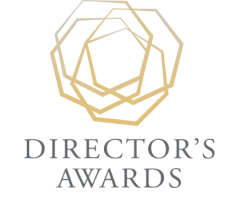Five CS Staff Honored With Berkeley Lab Director Achievement Awards
October 20, 2022
by Linda Vu
Contact: CScomms@lbl.gov
Five computing science organization employees will accept the Director’s Award for Exceptional Achievement at a ceremony held in Berkeley Lab’s 50B Auditorium on November 10 at 3 p.m. Stream the event live at streaming.lbl.gov.
The Director’s Awards program recognizes the significant achievements of Lab employees. Each year, these awards are given for accomplishments, leadership, collaboration, multi-disciplinary science, cross-divisional projects, and commitment to excellence supporting the Lab’s mission and strategic goals. This year the Computing Sciences Area award recipients are David Brown, Marcus Noack, Talita Perciano, Silvia Crivelli, and Michael Wehner.
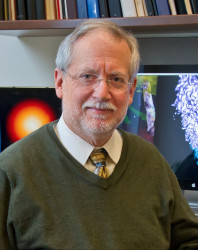
David Brown
2022 Stewardship Award: David Brown
This new award honors a history of extraordinary achievements in people, leadership, and resource management that serves the Lab and enables its mission of bringing scientific solutions to the world.
Brown is being recognized for his transformative vision that enabled Berkeley Lab’s computational research to shift and grow to meet new challenges in experimental and data sciences; for his championing of a diverse workforce, as well as the professional and personal development of his staff, and for his commitment to sharing Berkeley Lab’s visions and solutions with a broader community.
2022 Early Scientific Career: Marcus Noack and Talita Perciano
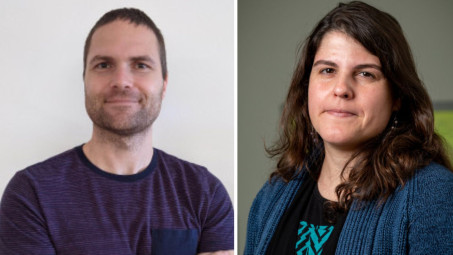
Marcus Noak (left) and Talita Perciano (right)
This award category recognizes scientists early in their career (typically within the first decade after earning their Ph.D.) who have made substantial contributions leading to important progress in an area of research or completion of a project.
Noack is being recognized for his groundbreaking, pioneering work on mathematical theory and algorithms for autonomous, self-driving experiments, and for the introduction and design of the widely-used open-source gpCAM software in applications across Berkeley Lab and the Department of Energy science.
And Perciano is being honored for her outstanding achievements in advancing theory and practice in artificial intelligence/machine learning and quantum computing, producing impactful software implementations that have meaningful applications to important scientific problems, and scientific publications in influential venues with international visibility.
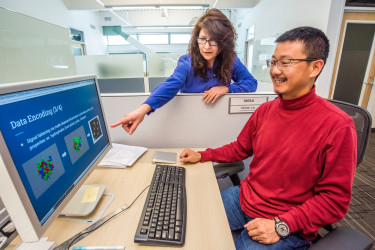
Silvia Crivelli (left) with intern Xinlian Liu (right).
2022 IDEA Award: Silvia Crivelli
This new award honors significant efforts to increase current and/or future diverse representation at the Lab. And Crivelli is being recognized for her tireless and unwavering efforts to broaden career pathways in the computational science field and at Berkeley Lab, particularly for her significant contributions to the Lab’s successful Sustainable Research Pathways Program.
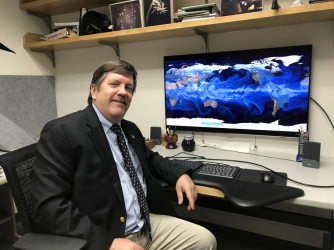
Michael Wehner
2022 Scientific: Michael Wehner
This award category honors exceptional scientific or technical contributions leading to important progress in an area of research. Wehner is being recognized for his foundational scientific achievements in developing methods for climate change attribution that provided critical tools decision-makers can use to develop strategies that help mitigate climate change effects and ultimately prevent natural disasters.
About Berkeley Lab
Founded in 1931 on the belief that the biggest scientific challenges are best addressed by teams, Lawrence Berkeley National Laboratory and its scientists have been recognized with 16 Nobel Prizes. Today, Berkeley Lab researchers develop sustainable energy and environmental solutions, create useful new materials, advance the frontiers of computing, and probe the mysteries of life, matter, and the universe. Scientists from around the world rely on the Lab’s facilities for their own discovery science. Berkeley Lab is a multiprogram national laboratory, managed by the University of California for the U.S. Department of Energy’s Office of Science.
DOE’s Office of Science is the single largest supporter of basic research in the physical sciences in the United States, and is working to address some of the most pressing challenges of our time. For more information, please visit energy.gov/science.









